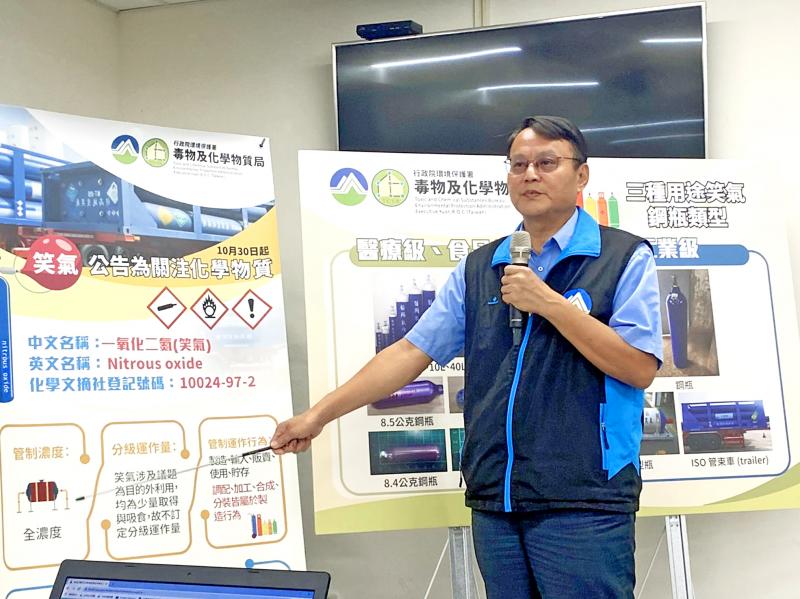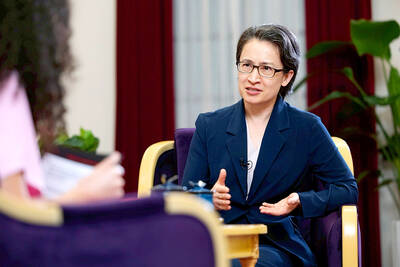Nitrous oxide, commonly known as laughing gas, has been listed in Taiwan as a controlled substance, meaning the regulations governing its production, importation, sale, use and storage have been tightened, the Environmental Protection Administration (EPA) said yesterday.
The EPA yesterday listed laughing gas as the first non-toxic chemical regulated under the Toxic Chemical Substances Control Act (毒性化學物質管理法), Toxic and Chemical Substances Bureau Director-General Hsieh Yein-rui (謝燕儒) said.
While nitrous oxide is used in several industries, including the semiconductor manufacturing and food sectors, its unregulated use for recreational purposes has increased in the past few months, the EPA told a news conference in Taipei.

Photo: CNA
For example, the number of cases in which laughing gas was abused for recreational purposes in Taoyuan jumped from 134 last year to 455 in the first seven months of this year, police data showed.
Unlicensed operators involved in the supply and use of controlled chemicals are subject to a fine of NT$30,000 to NT$300,000 (US$1,037 to US$10,372), while in cases where unlicensed use of the chemical results in death, the penalty is seven years to life in prison and a fine of up to NT$10 million, Hsieh said, citing the act.
If it is determined that illegal use of the chemical resulted in harm to other people’s health, a person found to have contravened the act faces a prison sentence of six months to 10 years, and a fine of NT$1 million to NT$5 million, he said.
Laughing gas was previously covered under the Pharmaceutical Affairs Act (藥事法).
Manufacturers of the chemical are now required to record each transaction online and submit a monthly report to the government on those transactions, while unlicensed producers, sellers, importers and users have until May 1 next year to obtain permits, Hsieh said.
The EPA, the Ministry of Health and Welfare and the police next month are to launch an effort to tackle the growing misuse of the chemical, he said.
The effort would focus on stopping illegal online sales of laughing gas and ensuring that it is properly labeled when sold legally, Hsieh said.
As of Wednesday last week, the EPA had carried out inspections of six laughing gas producers and more than 150 companies had submitted transaction records, he said.
As part of the efforts to deter recreational use of laughing gas, the government would require producers to add sulfur dioxide, which has a pungent odor, to orders for some customers, depending on proposed use, the EPA said.
Recreational use of laughing gas produces a feeling of euphoria, the EPA said.
Side effects include nausea and vomiting, as well as vitamin B-12 deficiency with long-term use, which could lead to nerve damage, it said.

Temperatures in northern Taiwan are forecast to reach as high as 30°C today, as an ongoing northeasterly seasonal wind system weakens, the Central Weather Administration (CWA) said. CWA forecaster Tseng Chao-cheng (曾昭誠) said yesterday that with the seasonal wind system weakening, warmer easterly winds would boost the temperature today. Daytime temperatures in northern Taiwan and Yilan County are expected to range from 28°C to 30°C today, up about 3°C from yesterday, Tseng said. According to the CWA, temperature highs in central and southern Taiwan could stay stable. However, the weather is expected to turn cooler starting tonight as the northeasterly wind system strengthens again

The Ministry of Foreign Affairs (MOFA) yesterday expressed “grave concerns” after Singaporean Prime Minister Lawrence Wong (黃循財) reiterated the city-state’s opposition to “Taiwanese independence” during a meeting with Chinese Premier Li Qiang (李強). In Singapore on Saturday, Wong and Li discussed cross-strait developments, the Singaporean Ministry of Foreign Affairs said in a statement. “Prime Minister Wong reiterated that Singapore has a clear and consistent ‘one China’ policy and is opposed to Taiwan independence,” it said. MOFA responded that it is an objective fact and a common understanding shared by many that the Republic of China (ROC) is an independent, sovereign nation, with world-leading

COOLING OFF: Temperatures are expected to fall to lows of about 20°C on Sunday and possibly 18°C to 19°C next week, following a wave of northeasterly winds on Friday The Central Weather Administration (CWA) on Sunday forecast more rain and cooler temperatures for northern Taiwan this week, with the mercury dropping to lows of 18°C, as another wave of northeasterly winds sweeps across the country. The current northeasterly winds would continue to affect Taiwan through today, with precipitation peaking today, bringing increased rainfall to windward areas, CWA forecaster Liu Pei-teng (劉沛滕) said. The weather system would weaken slightly tomorrow before another, stronger wave arrives on Friday, lasting into next week, Liu said. From yesterday to today, northern Taiwan can expect cool, wet weather, with lows of 22°C to 23°C in most areas,

DEFENDING FREEDOM: Taiwanese love peace and helping others, and hope to be a positive force in the world, Vice President Hsiao Bi-khim told ‘Weltspiegel’ Taiwan is making every effort to prevent war in the face of China’s hybrid coercion tactics and military threats, Vice President Hsiao Bi-khim (蕭美琴) said in an interview with German public broadcaster ARD’s program Weltspiegel that aired on Monday. Taiwan is not seeking provocation or intending to disrupt international order, but “must possess the capacity for self-defense,” a news release issued by the Presidential Office yesterday quoted her as saying. Taiwan is closely watching not only the increasing scope and frequency of Chinese military exercises around the nation, but also Beijing’s hybrid and cognitive warfare tactics, including manipulating public opinion, fostering